9B Unit2 Great people 词句精讲精练
2022九年级英语上册Unit2GreatPeople单元知识点归纳重点单词短语句式辨析冀教版

Unit 2 Great People单词1. meaning作可数名词,意为“意思”,是动词mean的动名词形式起形容词作用。
Can you tell me the meaning of this new word? 你能告诉我这个生词的意思吗?2. successful作形容词,意为“获得成功的、有成就的”,在句中作定语或表语。
This is a successful decision. 这是一个成功的决定。
I think you’ll be successful in the future. 我想将来你会成功的。
success 是不可数名词,意为“成功”;succeed 是不及物动词,意为“成功”。
表示“在方面成功”用句式be succeeded in?。
Failure is mother of success. 失败是成功之母。
They are succeeded in solving all the problems. 他们成功地解决了所有的问题。
3. solve作及物动词,意为“解答、解决”,后加名词或代词作宾语。
I don’t think I can solv e these problems. 我想我不能解决这些问题。
4. pioneer作可数名词,意为“先锋、先驱、带头人”,复数形式是pioneers。
As a technician, he is a remarkable pioneer. 作为技术人员,他是个了不起的先驱。
5. introduction作可数名词,意为“初次投入使用、引进、推进、介绍”,它是动词introduce的名词形式。
The introduction of this new skill brings many changes to us. 这种新技能的引进给我们带来了很多变化。
6. leader作可数名词,意为“领导者、领袖”,它是动词lead 的名词形式,复数形式是leaders。
2017 10 牛津译林英语9B unit2 Great people 中考语法专题2:时态专练
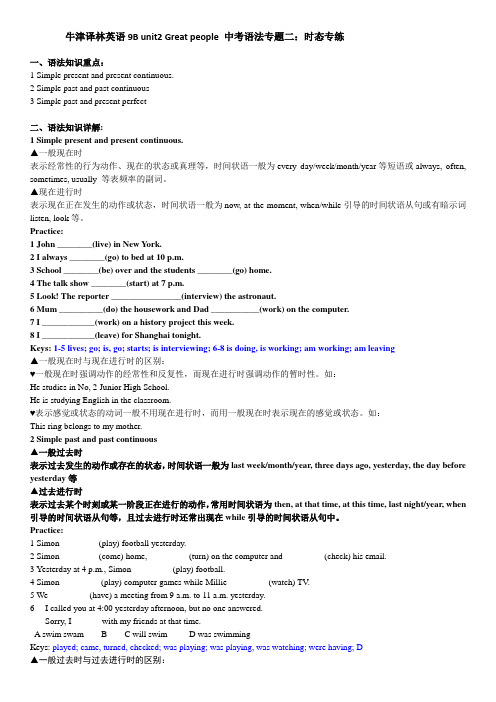
牛津译林英语9B unit2 Great people 中考语法专题二:时态专练一、语法知识重点:1 Simple present and present continuous.2 Simple past and past continuous3 Simple past and present perfect二、语法知识详解:1 Simple present and present continuous.▲一般现在时表示经常性的行为动作、现在的状态或真理等,时间状语一般为every day/week/month/year等短语或always, often, sometimes, usually 等表频率的副词。
▲现在进行时表示现在正在发生的动作或状态,时间状语一般为now, at the moment, when/while引导的时间状语从句或有暗示词listen, look等。
Practice:1 John ________(live) in New York.2 I always ________(go) to bed at 10 p.m.3 School ________(be) over and the students ________(go) home.4 The talk show ________(start) at 7 p.m.5 Look! The reporter ________________(interview) the astronaut.6 Mum __________(do) the housework and Dad ___________(work) on the computer.7 I ____________(work) on a history project this week.8 I ____________(leave) for Shanghai tonight.Keys: 1-5 lives; go; is, go; starts; is interviewing; 6-8 is doing, is working; am working; am leaving▲一般现在时与现在进行时的区别:♥一般现在时强调动作的经常性和反复性,而现在进行时强调动作的暂时性。
九年级英语下册 知识讲义-重点句型 Unit 2 Great people

学习目标1. 学习重要的句型,理解句型的含义。
2. 正确地运用句型,并能灵活地用于作文。
重点:He became interested in flying when he took his first flight at the age of six.He and David Scott managed to join two spacecraft together for the first time in space.I think Yuan Longping, a rice scientist and a member of the Chinese Academy of Engineering is one of the greatest people that have ever lived.难点:现在和过去时态的灵活运用。
知识梳理一、重点句型【句型学习】1. He became interested in flying when he took his first flight at the age of six. 他六岁第一次乘飞机的时候就对飞行感兴趣。
(1) become interested in 对……感兴趣(2) take his first flight 第一次乘飞机(3) at the age of 在……岁的时候The boy became interested in playing football. 这个男孩对踢足球感兴趣。
Could you tell me when you took your first flight? 你能告诉我你什么时候第一次乘飞机吗?The girl could swim at the age of 8. 这个女孩八岁的时候会游泳。
同义句转换1. My father became interested in driving a car two years ago.My father ____________________________________________________.2. When he was 20 years old, he left his hometown.He left his hometown ________________________________.3. The girl was very nervous when she took a plane for the first time.The girl was very nervous when she ____________________________________.答案:1. has been interested in driving a car since two years ago 2. at the age of 203. took her first flight2. He and David Scott managed to join two spacecraft together for the first time in space. 他和大卫斯科特在太空中首次设法成功地把两艘飞船连接到一起。
Unit 2 Great people知识点归纳牛津译林版英语九年级下册
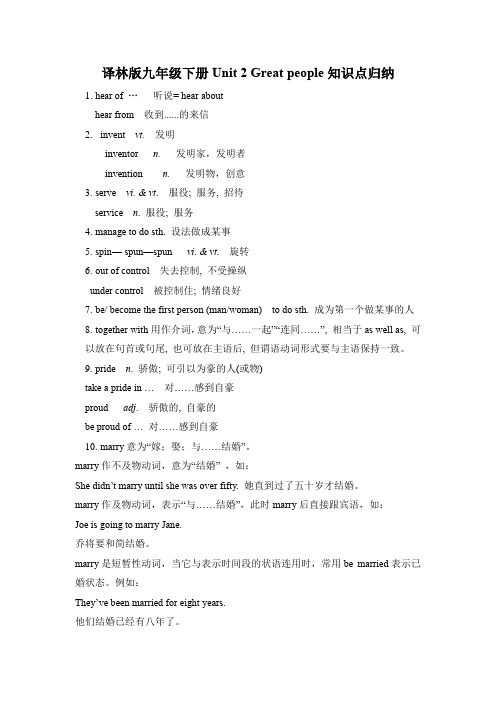
译林版九年级下册Unit 2 Great people知识点归纳1.hear of …听说= hear abouthear from 收到......的来信2.invent vt. 发明inventor n. 发明家,发明者invention n.发明物,创意3.serve vi. & vt. 服役; 服务, 招待service n. 服役; 服务4.manage to do sth. 设法做成某事5.spin— spun—spun vi. & vt. 旋转6.out of control 失去控制, 不受操纵under control 被控制住; 情绪良好7.be/ become the first person (man/woman) to do sth. 成为第一个做某事的人8.together with用作介词,意为“与……一起”“连同……”, 相当于as well as, 可以放在句首或句尾, 也可放在主语后, 但谓语动词形式要与主语保持一致。
9.pride n. 骄傲; 可引以为豪的人(或物)take a pride in … 对……感到自豪proud adj. 骄傲的, 自豪的be proud of … 对……感到自豪10.marry意为“嫁;娶;与……结婚”。
marry作不及物动词,意为“结婚” ,如:She didn’t marry until she was over fifty. 她直到过了五十岁才结婚。
marry作及物动词,表示“与……结婚”,此时marry后直接跟宾语,如:Joe is going to marry Jane.乔将要和简结婚。
marry是短暂性动词,当它与表示时间段的状语连用时,常用be married表示已婚状态。
例如:They’ve been married for eight years.他们结婚已经有八年了。
11.happen to do sth. 碰巧做某事12.make a contribution to sth. / doing sth. 为……作出贡献13.increase vt. 增加increase by … 增加了……increase to … 增加到……时态对比1.一般现在时和现在进行时的对比时态用法特征词一般现在时 1. 经常性、习惯性的动作或存在的状态。
冀教版英语九年级全册Unit 2 Great People 重难点知识归纳总结
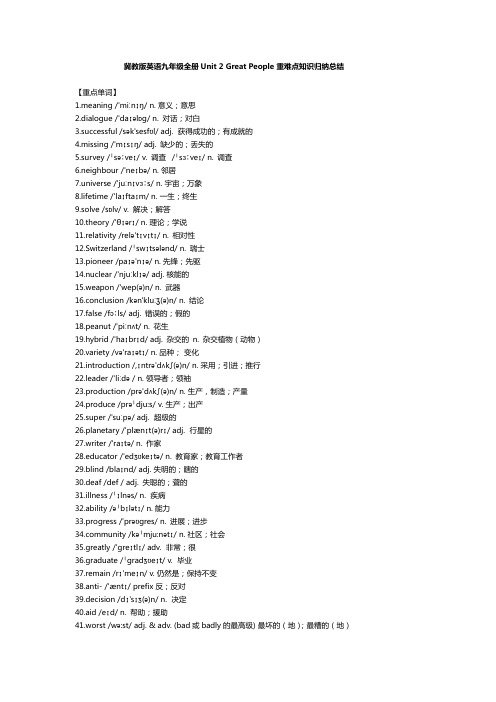
冀教版英语九年级全册Unit 2 Great People 重难点知识归纳总结【重点单词】1.meaning /'miːnɪŋ/ n. 意义;意思2.dialogue /'daɪəlɒg/ n. 对话;对白3.successful /sək'sesfʊl/ adj. 获得成功的;有成就的4.missing /'mɪsɪŋ/ adj. 缺少的;丢失的5.survey /ˈsəːveɪ/ v. 调查/ˈsɜːveɪ/ n. 调查6.neighbour /'neɪbə/ n. 邻居7.universe /'juːnɪvɜːs/ n. 宇宙;万象8.lifetime /'laɪftaɪm/ n. 一生;终生9.solve /sɒlv/ v. 解决;解答10.theory /'θɪərɪ/ n. 理论;学说11.relativity /relə'tɪvɪtɪ/ n. 相对性12.Switzerland /ˈswɪtsələnd/ n. 瑞士13.pioneer /paɪə'nɪə/ n. 先锋;先驱14.nuclear /'njuːklɪə/ adj. 核能的15.weapon /'wep(ə)n/ n. 武器16.conclusion /kən'kluːʒ(ə)n/ n. 结论17.false /fɔːls/ adj. 错误的;假的18.peanut /'piːnʌt/ n. 花生19.hybrid /'haɪbrɪd/ adj. 杂交的n. 杂交植物(动物)20.variety /və'raɪətɪ/ n. 品种;变化21.introduction /,ɪntrə'dʌkʃ(ə)n/ n. 采用;引进;推行22.leader /'liːdə / n. 领导者;领袖23.production /prə'dʌkʃ(ə)n/ n. 生产,制造;产量24.produce /prəˈdju:s/ v. 生产;出产25.super /'suːpə/ adj. 超级的26.planetary /'plænɪt(ə)rɪ/ adj. 行星的27.writer /'raɪtə/ n. 作家cator /'edʒʊkeɪtə/ n. 教育家;教育工作者29.blind /blaɪnd/ adj. 失明的;瞎的30.deaf /def / adj. 失聪的;聋的31.illness /ˈɪlnəs/ n. 疾病32.ability /əˈbɪlətɪ/ n. 能力33.progress /'prəʊgres/ n. 进展;进步munity /kəˈmju:nətɪ/ n. 社区;社会35.greatly /'greɪtlɪ/ adv. 非常;很36.graduate /ˈɡradʒʊeɪt/ v. 毕业37.remain /rɪ'meɪn/ v. 仍然是;保持不变38.anti- /'æntɪ/ prefix 反;反对39.decision /dɪ'sɪʒ(ə)n/ n. 决定40.aid /eɪd/ n. 帮助;援助41.worst /wə:st/ adj. & adv. (bad或badly的最高级) 最坏的(地);最糟的(地)42.condition /kən'dɪʃ(ə)n/ n. 环境;条件;状态;状况43.operate /'ɒpəreɪt/ v. 动手术;做手术ernment /ˈgʌvənmənt/ n. 政府45.medical /'medɪk(ə)l/ adj. 医疗的;医学的46.crossword /'krɒswɜːd/ n. 纵横字谜47.puzzle /'pʌz(ə)l/ n. 谜;智力游戏48.based /beɪst/ adj. (以……)为基础;(以……)为依据49.whom /huːm/ pron. (用作动词或介词的宾语)谁50.anybody /'enɪbɒdɪ/ pron. 任何人51.chemistry /'kemɪstrɪ/ n. 化学【重点短语】1.the meaning of... ……的意义2.wonder about 对……感到疑惑3.succeed in 在……方面成功4.try one’s best to do sth 尽某人最大的努力做某事5.live a good and happy life 过一种美好幸福的生活6.be good to sb 对某人友好7.seem like看起来像……8.write ... down 写下……9.go on to do sth 继续做某事10.in the field of 在……领域11.pass away 去世12.give up 放弃13.nuclear weapon 核武器14.stop doing sth 停止做某事15.make a mistake 犯错16.allow sb to do sth 允许某人做某事17.since then 从那时起18.together with 和……一起e up with 提出,想出20.be filled with 充满21.graduate from 从……毕业22.because of 由于23.in one’s spare time在某人的空闲时间24.make a lot of progress 取得很大的进步25.learn to do sth 学会做某事26.make a decision to do sth 决定做某事27.first aid 急救28.set up 建立29.day after day 日复一日【重点句型】1.It seems like something is missing.好像少了点什么。
Unit2 Great people单元词句梳理-牛津译林版九年级英语下册
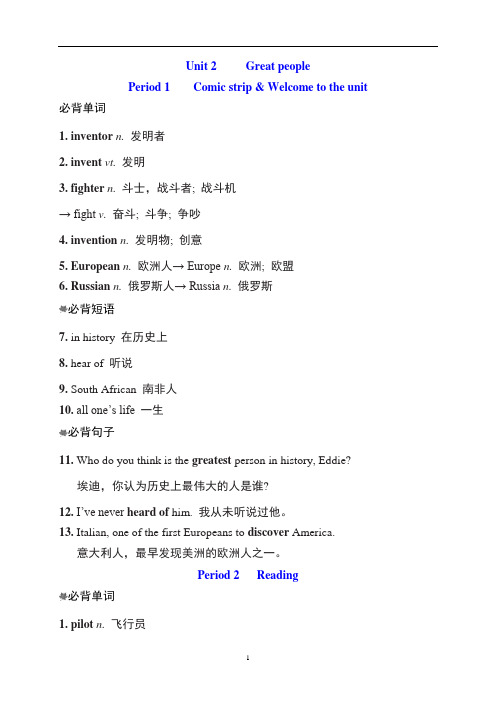
Unit 2 Great peoplePeriod 1 Comic strip & Welcome to the unit 必背单词1. inventor n. 发明者2. invent vt.发明3. fighter n. 斗士,战斗者; 战斗机→ fight v.奋斗; 斗争; 争吵4. invention n. 发明物; 创意5. European n.欧洲人→ Europe n. 欧洲; 欧盟6. Russian n. 俄罗斯人→ Russia n. 俄罗斯必背短语7. in history 在历史上8. hear of 听说9. South African 南非人10. all one’s life 一生必背句子11. Who do you think is the greatest person in history, Eddie?埃迪,你认为历史上最伟大的人是谁?12. I’ve never heard of him. 我从未听说过他。
13. Italian, one of the first Europeans to discover America.意大利人,最早发现美洲的欧洲人之一。
Period 2 Reading必背单词1. pilot n.飞行员2. serve vi&vt. 服役; 服务,招待→ server n. 侍者3. test vt.测试; 检验4. control n. 控制,支配5. order n.命令,指挥,要求→ order v. 命令; 订购; 点餐6. Pacific adj.太平洋的7. land vt. & vi. (使) 着陆,(使) 降落→ land n.陆地; 国土; 土地8. step vi. 走,跨步→ step n.一步; 步骤; 台阶; 步伐9. surface n. 表面; 表层10. further adj.更多的,更进一步的11. pride n. 骄傲; 可引以为豪的人(或物)必背短语12. serve as 担任13. be chosen to 被选中14. manage to 想方设法做……15. out of control 失去控制16. cut ... short 缩短……17. the western Pacific Ocean 西太平洋18. the pride of ……的骄傲必背句子19. He became interested in flying when he took his first flight at the age ofsix. 当他六岁第一次乘飞机时,他就对飞行产生了兴趣。
牛津译林版九年级下册 Unit 2 Great people 知识点总结讲解

牛津译林版9B Unit 2 Great people 知识点讲解一、词汇1.fight n. 飞行,班机fly-flight-flew-flown-flyingflight-journey by air平稳的/舒适的空中飞行a smooth /comfortable flight国际航班international flight飞行安全flight safety你知道他乘的航班是多少? Do you know what his flight number is ?He became interested in flying ever since he took his first flight (第一次坐飞机)at the age of six.2.pilot n. 飞行员获得了学生飞行执照receive his student pilot’s licencea test pilot for NACA and NASA1 2 3Note: 1.试飞员 2. 美国国家航空咨询委员会 3. 美国国家航空和航天局3. spare adj. 空闲的,多余的在空余时间里in one’s spare time= in one’s free timeI haven’t had a spare moment this morning. 我一个上午一会儿也没闲着There were no spare seats on the bus, so we had to stand. 车上没有多余的座位, 我们只好站着。
I have no spare money. 我没有多余的钱。
4.aeroplane <AmE>飞机airplane=plane(BrE/AmE)建飞机模型build model airplanes5.navy n. 海军navy-navies当海军航空兵work as a naval pilotjoin the navy 参加海军He has been in the navy (参加海军) for five years.6. select vt. 挑选,选择select sb/sth, select to do select sb to doIn 1962,he was selected to become an astronaut. 1962年,他被挑选为一名宇航员。
Unit 2 Great people知识梳理 九年级英语下册

Unit 2 Great people一、单词名词inventor发明者fighter 斗士,战斗者;战斗机invention发明物;创意European欧洲人Russian俄罗斯人pilot飞行员control控制,支配order命令,指挥,要求surface表面;表层pride 骄傲;可引以为豪的人(或物)passage章节,乐段mathematics ( = maths )数学scientist科学家laboratory ( = lab )实验室discovery发现;发现物advantage优势,有利条件development发展动词invent发明serve服役;服务,招待test测试;检验land (使)着陆,(使)降落increase增加形容词Pacific太平洋的further更多的,更进一步的unknown未知的,不出名的二、短语South African南非人out of control失去控制,无法管理cut...short缩短by hand手工happen to碰巧at present现在,目前三、句型1. Who do you think is the greatest person in history, Eddie? 埃迪,你认为史上最伟大的人是谁?(do you think作插入语)2. I've never heard of him. 我从未听说过他。
3. He became interested in flying when he took his first flight at the age of six. 当他六岁第一次乘飞机时就对飞行产生了兴趣。
4. Armstrong received the order to cut the flight short. 阿姆斯特朗接到缩短航程的指令。
5. On 20 July 1969, Armstrong became the first man to walk on the Moon. 1969年7月20日,阿姆斯特朗成为首位漫步月球的人。
江苏 牛津译林版 英语 九下 9B Unit2 Great people 知识点
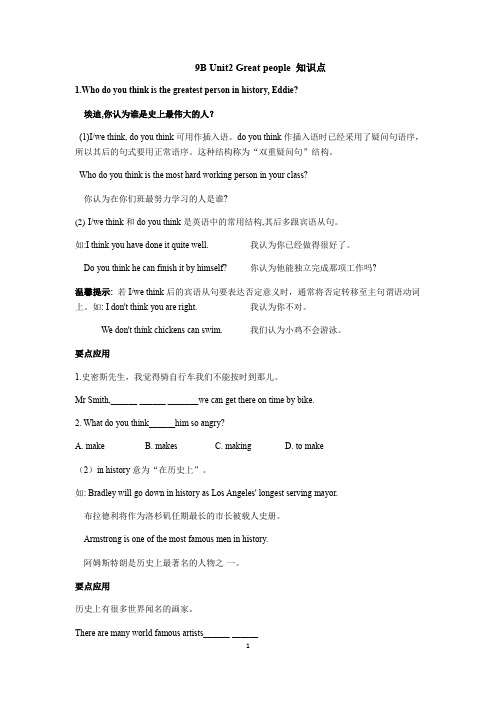
9B Unit2 Great people 知识点1.Who do you think is the greatest person in history, Eddie?埃迪,你认为谁是史上最伟大的人?(1)I/we think, do you think可用作插入语。
do you think作插入语时已经采用了疑问句语序,所以其后的句式要用正常语序。
这种结构称为“双重疑问句”结构。
Who do you think is the most hard working person in your class?你认为在你们班最努力学习的人是谁?(2)I/we think和do you think是英语中的常用结构,其后多跟宾语从句。
如:I think you have done it quite well.我认为你已经做得很好了。
Do you think he can finish it by himself?你认为他能独立完成那项工作吗?温馨提示: 若I/we think后的宾语从句要表达否定意义时,通常将否定转移至主句谓语动词上。
如: I don't think you are right. 我认为你不对。
We don't think chickens can swim.我们认为小鸡不会游泳。
要点应用1.史密斯先生,我觉得骑自行车我们不能按时到那儿。
Mr Smith,______ ______ _______we can get there on time by bike.2. What do you think______him so angry?A. makeB. makesC. makingD. to make(2)in history意为“在历史上”。
如: Bradley will go down in history as Los Angeles' longest serving mayor.布拉德利将作为洛杉矶任期最长的市长被载人史册。
牛津译林版9BUnit2 Great people基础知识 梳理

牛津译林版9BUnit2 Great people基础知识大梳理一.单词大整理1.inventor /ɪn'ventə / 发明者2.invent /ɪn'vent / 发明3.explore /ɪk'splɔː /*探险者;考察者4.South African /saʊθ ˈæfrɪk(ə)n / 南非人5.fighter /'faɪtə / 斗士,战斗者;战斗机6.invention /ɪn'venʃ(ə)n / 发明物;创意7.Italian /ɪ'tæljən / *意大利人8.European /jʊərə'piːən / 欧洲人9.Russian /'rʌʃ(ə)n / 俄罗斯人10.pilot /'paɪlət / 飞行员11.licence /'laɪsəns / *执照,许可证(英)12.license /'laɪsns / *执照,许可证(美)13.navy /'neɪvɪ / *海军14.serve /sɜːv /服役;服务,招待15.test /test / 测试;检验16.aircraft /'eəkrɑːft /*飞机,航空器17.astronaut /'æstrənɔːt /*宇航员18.spacecraft /'speɪskrɑːft / *(单复同)宇宙飞船,航天器19.spin /spɪn / *快速旋转20.control /kən'trəʊl / 控制,支配21.out of control /aʊt ɒv kənˈtrəʊl / 失去控制,无法管理22.order /'ɔːdə / 命令,指挥,要求23.cut ... short /kʌt / . . . /ʃɔːt /缩短24.Pacific /pə'sɪfɪk / 太平洋的25.ocean /'əʊʃ(ə)n / *海洋nd /lænd / (使)着陆,(使)降落27.step /step / 一步(n.);走,跨步(vi)28.giant /'dʒaɪənt / *巨大的;伟大的29.leap /liːp /*跳跃;跃升30.mankind /,mæn'kaɪnd / *人类31.step /step / 一步(n.);走,跨步(vi)32.surface /'sɜːfɪs / 表面;表层33.further /'fɜːðə / 更多的,更进一步的34.citizen /'sɪtɪz(ə)n / *公民;市民35.pride /praɪd / 骄傲;可引以为豪的人(或物)36.passage /'pæsɪdʒ / 章节,乐段37.by hand /baɪ hænd / 手工38.mathematics /mæθ(ə)'mætɪks / 数学(=maths)39.scientist /'saɪəntɪst / 科学家40.radium /'reɪdɪəm / *镭boratory /lə'bɒrə,t(ə)rɪ / 实验室(=lab)42.professor /prə'fesə / *教授43.discovery /dɪ'skʌv(ə)rɪ / 发现;发现物44.unknown /ʌn'nəʊn / 未知的;不出名的45.widely /'waɪdlɪ / 广泛地,普遍地46.hybrid /'haɪbrɪd / *杂交的47.title /'taɪt(ə)l / *标题;职位名称48.agriculture /'ægrɪkʌltʃə / *农业49.hunger /'hʌŋgə / *饥饿50.happen to /ˈhæp(ə)n tuː /碰巧51.advantage /əd'vɑːntɪdʒ /优势,有利条件52.at present /ætˈprez(ə)nt / 现在,目前53.contribution /kɒntrɪ'bjuːʃ(ə)n / *贡献54.increase /ɪn'kriːs /增加55.production /prə'dʌkʃ(ə)n / *生产;产量56.development /dɪ'veləpm(ə)nt / 发展二.短语大搜罗57.in history历史上58.hear of hear about听说;听到59.all one's life某人-生中60.become/be interested in对.感兴趣61.at the age of ...岁时62.join the navy加入海军63.all types of各种类型的64.for the first time首次;初次65.go into space进入太空66.in space在太空中;在宇宙中67.out of control失去控制(反: under control处于控制之下)68.cut.. .short缩短69.bring down (使飞机)降落70.together with .和...一起71.share sth. with sb.和某人分享某物72.step onto步入;踏上73.take back to the Earth 带回地球74.further research进一步研究75.because of因为76.be presented with被授.......77. a US citizen 一位美国公民78.the pride of.. ....的骄傲79.turn round and round旋转80.work on致力于;从事81.one after another相继地;依次地82.at a certain time在某时三.用法大突破83.manage+to do sth. 设法做成某事84.happen+to do sth. 碰巧做某事85.need to do sth. 需要做某事86.need doing... 需要被做.....87.be the first man to do sth.成为第一个做某事的人88.be allowed to do sth.被允许做某事89.as...as sb. can/could = as...as possible尽可能地90.It's +adj.+ (of sb.) to do sth.某人做某事是....91.It's +adj.+for sb. to do sth.做某事对某人来说.....92.It's said that +从句据说......93.That's why+从句那就....的原因。
(完整版)9BUnit2GreatPeople知识点归纳
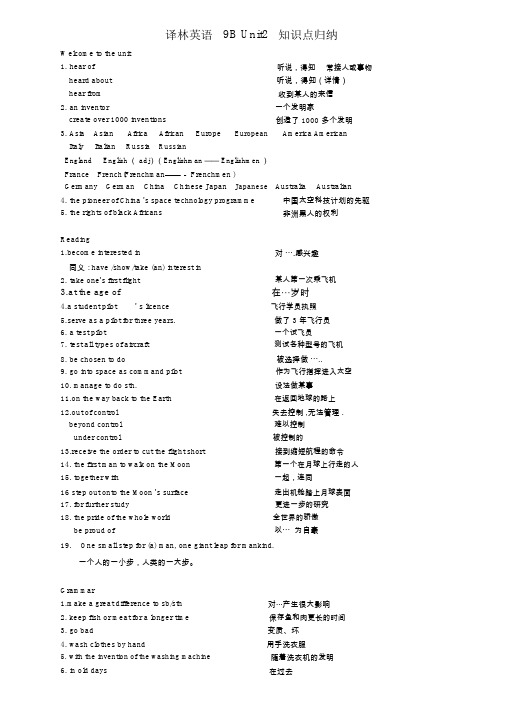
译林英语9B Unit2 知识点归纳Welcome to the unit1. hear ofheard abouthear from2. an inventorcreate over 1000 inventions3. Asia Asian Africa African Europe European Italy Italian Russia RussianEngland English ( adj)(Englishman —— Englishmen )France French(Frenchman——- Frenchmen ) Germany German China Chinese Japan Japanese4. the pioneer of China ’s space technology programme5. the rights of black Africans听说,得知常接人或事物听说,得知(详情)收到某人的来信一个发明家创造了 1000 多个发明America AmericanAustralia Australian中国太空科技计划的先驱非洲黑人的权利Reading1.become interested in同义 : have /show/take (an) interest in 2. take one’s first flight 对⋯.感兴趣某人第一次乘飞机3.at the age of 在⋯岁时4.a student pilot’ s licence飞行学员执照5.serve as a pilot for three years.做了3年飞行员6. a test pilot一个试飞员7. test all types of aircraft测试各种型号的飞机8. be chosen to do被选择做⋯..9. go into space as command pilot作为飞行指挥进入太空10. manage to do sth.设法做某事11.on the way back to the Earth在返回地球的路上12.out of control失去控制,无法管理. beyond control难以控制under control被控制的13.receive the order to cut the flight short接到缩短航程的命令14. the first man to walk on the Moon第一个在月球上行走的人15. together with一起,连同16 step out onto the Moon ’s surface走出机舱踏上月球表面17. for further study更进一步的研究18. the pride of the whole world全世界的骄傲be proud of以⋯为自豪19.One small step for (a) man, one giant leap for mankind.一个人的一小步,人类的一大步。
牛津译林版九年级下册英语:Unit 2 Great people 词汇与语法基础训练

Unit 2 Great people 知识精讲一、必背词汇inventor n.创造者invent v.创造explore n.探险者;考察者South African n.南非人fighter n.斗士,战斗者;战斗机invention n.创造物;创意Italian n.意大利人European n.欧洲人Russian n.俄罗斯人pilot n.飞行员licence n.执照,答应证〔英〕license v. 答应,受权〔美〕navy n.海军serve v.服役;效劳,招待test v.测试;检验aircraft n.飞机,航空器astronaut n.宇航员spacecraft n. (单复同)宇宙飞船,航天器spin v.快速旋转control n.控制,支配order n.命令,指挥,要求Pacific adj.太平洋的ocean n.海洋land v.〔使〕着陆,〔使〕降落step n.一步〔n.〕;走,跨步〔vi〕giant adj.宏大的;伟大的leap n.跳跃;跃升mankind n.人类step v.一步〔n.〕;走,跨步〔vi〕surface n.外表;表层further adj.更多的,更进一步的citizen n.公民;市民pride n.骄傲;可引以为豪的人〔或物〕passage n.章节,乐段mathematics n.数学〔=maths〕scientist n.科学家radium n.镭laboratory n.实验室〔=lab〕professor n.教授discovery n.发现;发现物unknown adj.未知的;不知名的widely adv.广泛地,普遍地hybrid adj. 杂交的title n.标题;职位名称agriculture n.农业hunger n.饥饿advantage n.优势,有利条件contribution n.奉献increase v.增加production n.消费;产量development n.开展二、重点词汇1. invent v. /ɪnˈvent/1). to design and/or create something that has never been made before创造,创造例句:The first safety razor was invented by company founder King C. Gillette in 1903.第一把平安剃刀由公司创始人金‧坎普‧吉列于1903年创造。
九年级英语下册 Unit 2 Great people语法专练课件 (新

—Yes,she is.She
at a junior high school.
A.taught
B.teaches
C.will teach D.have taugt
( A )2.—When will Uncle Sam come to see us?
—He’ll visit us this weekend.He
பைடு நூலகம்
me that by email.
A.told
B.is told
C.will tell D.was going to tell
( A )3.Sherlock Homes asked the man what he
at 19:00 yesterday.
A.was doing B.has done
C.is doing D.would do
单元语法专练
语法精讲
初中常用的动词时态 1.动词时态结构。 ( 1 )一般现在时:主语+be动词( am/is/are )/动词原形/动词的第三人称单数形式+其 他。 ( 2 )一般过去时:主语+动词的过去式+其他。 ( 3 )现在进行时:主语+am/is/are+动词的现在分词+其他。 ( 4 )过去进行时:主语+was/were+动词的现在分词+其他。 ( 5 )一般将来时:主语+shall/will/be going to+动词原形+其他。 ( 6 )现在完成时:主语+have/has+动词的过去分词+其他。
语法精讲
2.时态标志词。
时态 一般现在时 一般过去时 现在进行时 过去进行时 一般将来时
2024九年级英语上册Unit2GreatPeople易错考点专练习题课件新版冀教版
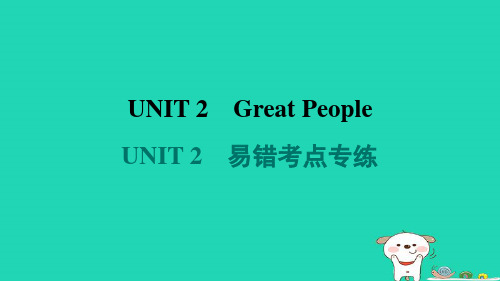
either… or, neither… nor, both… and与 not only… but also 的用法 易错点津:either...or...表示“或者……或者……”;
forever. 3. He died in a car accident three years ago.
4. Please come quickly; your friend is dying .
as的用法
易错点津:as可以引导时间状语从句,意为“当……时 候”,表示两个动作同时发生;as可以引导原因状语从 句,意为“因为,由于”;as也可以引导方式状语从句, 意为“照……方式”;as作介词,意为“作为……”;as 作副词,意为“像……一样”。as的常用短语有: such as 例如;as+形容词或副词原级+as和……一样……;as long as只要;as soon as一……就……;as well as也;the same as...和……一样。
A. 当……时候 B. 因为,由于 C. 作为…… D. 像……一样 E. 照……方式 ( D )3. — Now these products made in China have good
quality. —I can’t agree more. They are as good as those made in other countries.
UNIT 2 Great People UNIT 2 易错考点专练
- 1、下载文档前请自行甄别文档内容的完整性,平台不提供额外的编辑、内容补充、找答案等附加服务。
- 2、"仅部分预览"的文档,不可在线预览部分如存在完整性等问题,可反馈申请退款(可完整预览的文档不适用该条件!)。
- 3、如文档侵犯您的权益,请联系客服反馈,我们会尽快为您处理(人工客服工作时间:9:00-18:30)。
Unit2 Great people【词汇精讲】1. invent(1) invent 作动词,意为“发明;创造”。
例如:Edison invented the light bulb. 爱迪生发明了电灯。
(2) invent还可以表示“虚构”。
例如:The whole story was invented. 整个故事是虚构的。
(3) invent的名词形式有两个,一个是inventor(发明者;发明家),另一个是invention(发明物)。
例如:Edison is a great inventor in history. 爱迪生是历史上伟大的发明家。
Human history is also a history of great inventions. 人类的历史也是一个伟大发明的历史。
【拓展】invent和discover辨析:(1) invent 意为“发明,发明之物”指“从无到有”。
例如:Alexander Graham Bell invented the telephone in 1876.亚历山大·格雷厄姆·贝尔在1876年发明了电话。
(2) discover 意为“发现”,指“本来就已经存在,但不为人知”的事物。
例如:Columbus discovered America in 1492. 哥伦布在1492年发现了美洲。
2. hear ofhear of意为“听说,听到”,相当于hear about。
例如:I have never heard of him. 我从来没听人说起过他。
【拓展】hear; hear of与hear from的辨析:(1) hear“听见,听说”。
当“听见”讲时,强调结果,可直接带宾语或用于hear sb. / sth. do/ doing sth.意为“听见某人/某物(在)做某事”,当“听说”时,后面常接从句。
例如:Can you hear a bird singing in the tree now?你现在能听见鸟在树上唱歌吗?I heard that she passed the exam. 我听说她通过考试了。
(2) hear of“听说,得知”,后面接名词或代词,指听到某人或某事的存在或消息。
例如:Jim disappeared and nobody heard of him. Jim不知去向,没有人再听到他的消息。
(3) hear from“收到……来信”,后面常接人作宾语。
例如:Have you ever heard from your pen pal? 你是否收到过笔友的来信?3. receivereceive是及物动词,意为“收到,接到,得到”,其后可接介词from。
例如:I received a letter from my mother. 我收到母亲的一封来信。
【拓展】receive与accept的辨析:两个词都作动词用,都表示“接受,收到”之意,但在用法上有所不同。
receive表示的行为与主观意愿没有关系,着重于行为本身,不涉及收到者是否同意。
动作本身有一定的被动性。
accept表示的行为由主语的主观意志所决定,强调经过主语的考虑而接受。
动作本身是主动的。
例如:I received his invitation to the party yesterday, but I refused to accept it.昨天我收到了他的晚会请柬,但我拒绝接收。
4. joinjoin是动词,意为“参加,加入”。
宾语有以下几种形式:(1) join + 表示团体或组织的名词,join意为“加入(某团体),成为……(成员)”。
例如:Yao Ming joined the NBA. 姚明加入了NBA。
(2) join + 指人的名词或代词,join意为“加入……之中”。
例如:Will you join us for lunch? 和我们一起吃午饭好吗?(3) join + in + 活动类名词,join in意为“参加(活动)。
”例如:Can you join in the game? 你能参加这个游戏吗?【拓展】join; join in和take part in 的辨析:(1) join指加入某党派、某组织或某社会团体,以及参军等,并成为其中一员。
(2) join in指参加某项比赛或活动,常用于口语中,也可用于join sb. in (doing) sth. 意为“加入……(做)……”。
(3) take part in指参加群众性的活动、会议、劳动、游行等,往往指参加者持有积极的态度,起一定作用,有时与join in互换。
例如:I joined the army in 1996. 我是1996年参军的。
I didn’t take part in the sports meeting yesterday because I was ill.我没有参加昨天的运动会,因为我病了。
May I join in the football match?我可以参加这场足球比赛吗?5. pridepride作名词,意为“骄傲,自豪”。
常用的结构:take pride in sth. 意为“为某事骄傲”。
例如:They take great pride in her daughter who is now a famous scientist.他们为成为科学家的女儿而感到自豪。
He is the pride of our city. 他是我们城市的骄傲。
【拓展】proud 作形容词,意为“骄傲的,自豪的”。
常用结构:be proud of sth. 意为“以……而骄傲”。
例如:I am very proud of being a Chinese. 作为一名中国人我很自豪。
be proud to do sth 意为“为做某事而骄傲”。
例如:We are proud to be a league member. 我们为成为团员而骄傲。
6. movemove的用法比较多,总结如下:(1) move可作及物动词,意为“移动、搬动、使改变位置(或姿势)”。
例如:He moved the sofa to the left. 他把沙发移到左边。
(2) move作及物动词,还可意为“感动、鼓动、激动”。
例如:The speech moved them to tears. 那场演说把他们感动得落泪。
(3) move还可作不及物动词,意为“离开、动身迁移、搬家”。
例如:He moved his family to a smaller house. 他把家搬到一个较小的房子里。
注意:搬到某地常用move to + 地点,但当副词作地点状语时,此时可省略掉to。
【拓展】move house搬家move to Paris搬到巴黎move in搬进,迁进move on 继续前进7. marrymarry既可用作及物动词,也可用作不及物动词,意为“结婚;嫁;娶;与……结婚等”。
常见用法如下:(1) marry sb.意为“与……结婚”。
例如:John married Mary last week. 上星期约翰和玛丽结婚了。
(2) be/get married to sb.意为“与某人结婚”。
例如:Alice was married to a doctor last month. 上个月爱丽丝和一位医生结婚了。
(3) marry sb. to sb.意为“把某人嫁给某人”。
例如:She married her daughter to a businessman. 她把女儿嫁给了一位商人。
(4) marry 一般不与介词with 连用。
例如:She married an Englishman.She was / got married to an Englishman.她和一位英国人结了婚。
(5) 若问某人是否结婚,而不涉及结婚的对象,可用be / get married的形式,相当于系表结构。
例如:Are you married?/ Have you got married? 你结婚了吗?8. happenhappen是不及物动词,它的用法有:(1) 表示“某地/某时发生了什么事”,常用“sth. + happened + 时间/地点”这一结构,此时主语应该是物。
例如:The story happened in 2008. 这个故事发生在2008年。
An accident happened in that street. 那条街上发生了一起事故。
(2) 表示“某人出了某事(常指不好的事)”要用“sth. + happened + to sb.”这一结构。
例如:A car accident happened to her this morning. 今天上午她出了车祸。
What happened to you? 你怎么啦?(3) 表示“某人碰巧做某事”要用“sb. + happened + to do sth.”这一结构。
例如:I happened to meet a friend of mine in the street yesterday.昨天我碰巧在街上遇到了我的一个朋友。
【拓展】happen和take place的辨析:(1) happen指具体客观事物的发生,常有偶然性,未能预见性,即“偶然发生”。
例如:What happened to him? 他出了什么事?(2) take place常用于历史事件或会议的发生,以及化学、物理变化,有事先预料或计划的意思,即“计划发生”。
例如:The party took place yesterday evening. 昨晚举办了晚会。
注意:happen和take place均为不及物动词,无被动语态。
词汇精练I. 英汉互译。
1. hear of2. 对……感兴趣3. all one’s life4. 失去控制5. join the navy6. 产生很大的影响7. together with 8. 被广泛使用9. die of 10. 碰巧做某事11. at present 12. 据说……II. 根据首字母及汉语提示写出正确的单词。
1. David wants to be a (飞行员)when he grows up.2. —Who was the light bulb (发明)by?—Edison.3. We study English,(物理)and other subjects at school.4. He is from France. He is a E .5. He has solved the problem of (饥饿)for many people.6. The X-ray machines are now w_______used in hospitals.7. Neil Armstrong is the p_______of the whole world.8. If you want to be a great person, first of all you should be a good c_______.III.根据句意用词的适当形式填空。
